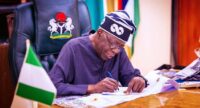Nigerian naira appreciated against the U.S dollar by about 1.2% over the past week, moving from N1,519/$ to N1,497/$.
The Central Bank of Nigeria will be meeting today to fix interest rate.
The largest daily gain occurred on September 19, with a 0.66% drop in the USD/NGN exchange rate.
The Nigerian central bank’s Monetary Policy Committee (MPC) began a two-day meeting on Monday, September 22, and is scheduled to announce its decision on September 23
Markets are anticipating that Nigeria’s central bank will lower interest rates on Wednesday, citing a stronger naira and lower inflation as potential reasons for relaxing monetary policy.
Headline inflation has declined for the fifth consecutive month to 20.1% year-over-year in August, influenced by naira stability and increased foreign exchange reserves.
Currently, the USD/NGN pair is testing key resistance levels at N1,519/$–N1,524/$, while support levels are being tested at N1,476/$–N1,485/$, which were observed in January and February 2025.
The naira has also strengthened in the black market, trading between N1,515 and N1,517/$ bandwidth. Several factors are supporting the naira’s rise, including improved supply and exchange rate reserves. An increase in external reserves has resulted from higher oil export, production, and natural gas revenue, while oil theft in Nigeria is near a decade low
This turnaround can also be attributed to the reforms implemented by the Central Bank of Nigeria (CBN) and a decrease in speculative trading.
Market projections suggest that the MPC may reduce its benchmark rate from 27 to 25 basis points, and a narrower corridor around the policy rate may be employed to improve control over interbank liquidity.
The naira’s strength has been bolstered by expectations of a potential rate cut by the Federal Reserve and concerns regarding tariffs, which have contributed to a 10% drop in the US Dollar Index (DXY) so far this year.
Emerging market currencies tend to experience less pressure when the USD declines, benefiting the naira indirectly.








